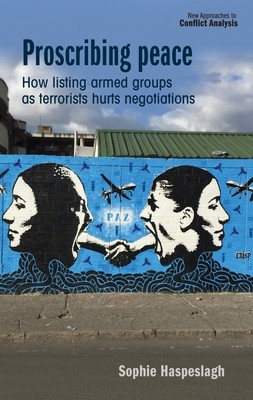
- We will send in 10–14 business days.
- Author: Sophie Haspeslagh
- Publisher: Manchester University Press
- ISBN-10: 1526171562
- ISBN-13: 9781526171566
- Format: 15.6 x 23.4 x 1.3 cm, minkšti viršeliai
- Language: English
- SAVE -10% with code: EXTRA
Reviews
Description
Proscribing peace offers a systematic examination of the impact of proscription on peace negotiations.
By introducing the concept of 'linguistic ceasefire', Haspeslagh adds to our understanding of the timing and sequencing of peace processes in the context of proscription. With relevance for more than half of the conflicts around the world in which an armed group is listed as a terrorist organisation, 'linguistic ceasefire' helps to explain why certain conflicts remain stuck in the 'terrorist' framing, while others emerge from it. International proscription regimes criminalise both the actor and the act of terrorism. Proscribing peace calls for an end to the amalgamation between acts and actors. By focussing on the acts instead, Haspeslagh argues, international policy would be better able to consider the violent actions both of armed groups and those of the state. By separating the act and the actor, change - and thus peace - become possible.EXTRA 10 % discount with code: EXTRA
The promotion ends in 21d.22:02:12
The discount code is valid when purchasing from 10 €. Discounts do not stack.
- Author: Sophie Haspeslagh
- Publisher: Manchester University Press
- ISBN-10: 1526171562
- ISBN-13: 9781526171566
- Format: 15.6 x 23.4 x 1.3 cm, minkšti viršeliai
- Language: English English
Proscribing peace offers a systematic examination of the impact of proscription on peace negotiations.
By introducing the concept of 'linguistic ceasefire', Haspeslagh adds to our understanding of the timing and sequencing of peace processes in the context of proscription. With relevance for more than half of the conflicts around the world in which an armed group is listed as a terrorist organisation, 'linguistic ceasefire' helps to explain why certain conflicts remain stuck in the 'terrorist' framing, while others emerge from it. International proscription regimes criminalise both the actor and the act of terrorism. Proscribing peace calls for an end to the amalgamation between acts and actors. By focussing on the acts instead, Haspeslagh argues, international policy would be better able to consider the violent actions both of armed groups and those of the state. By separating the act and the actor, change - and thus peace - become possible.

Reviews